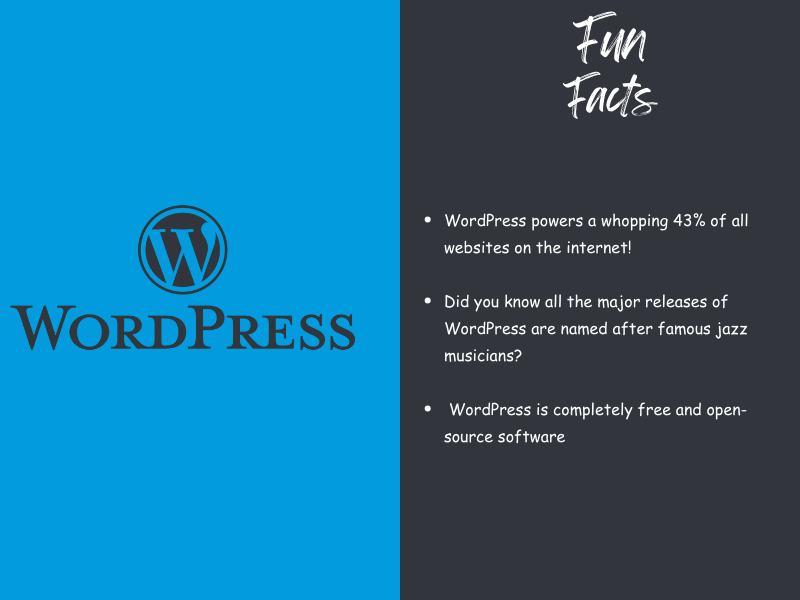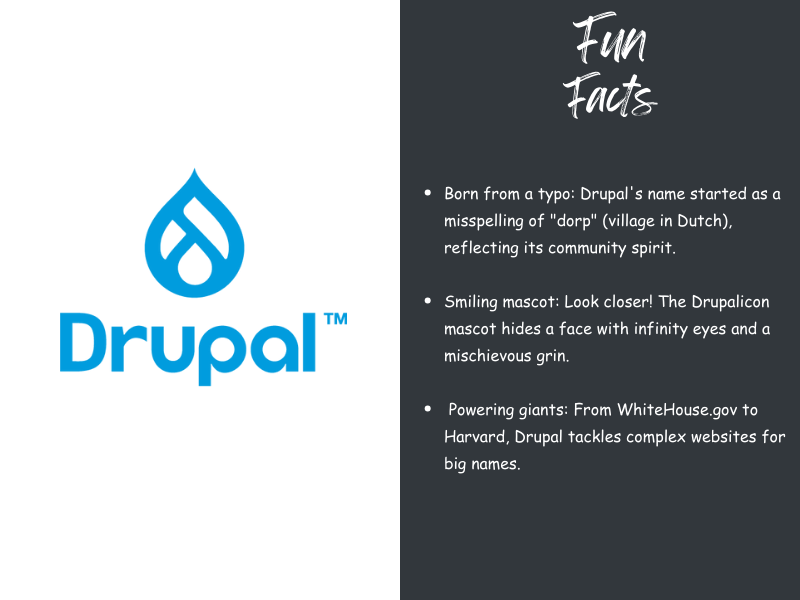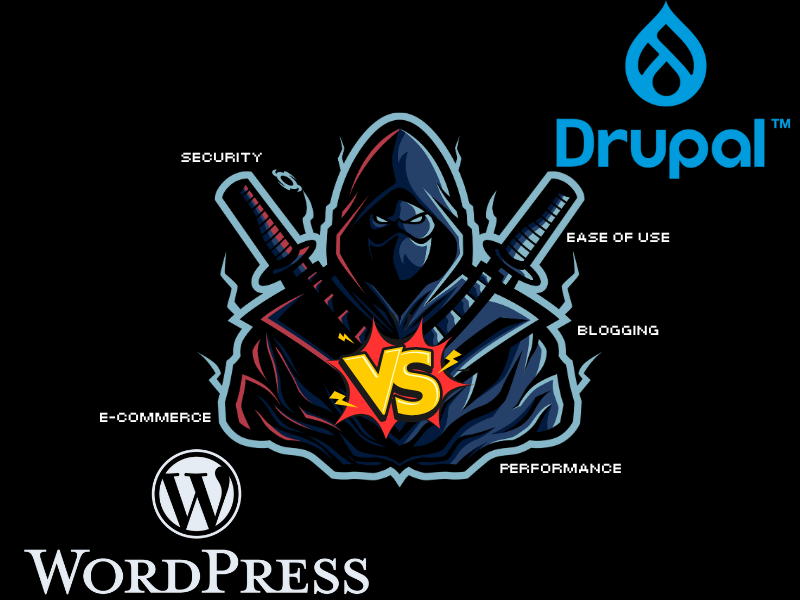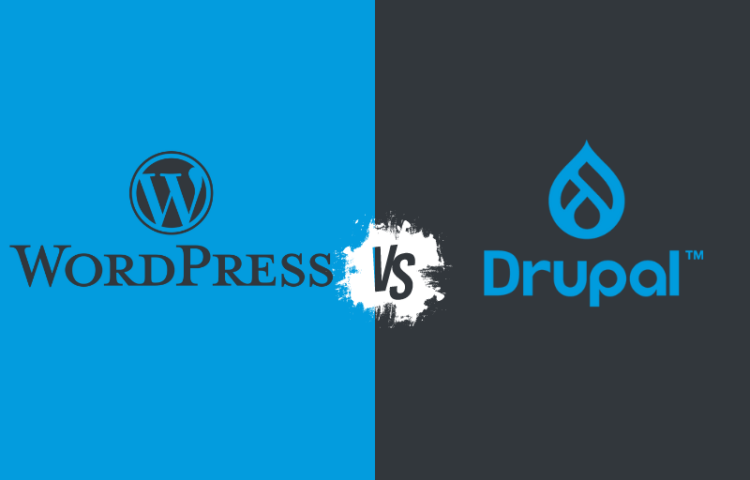In the vast world of technology, your website holds immense importance. It serves as the foundation for your brand, the central point for engaging with customers, and the dedicated sales representative that never rests. Before embarking on your digital journey, a solid foundation is essential. You require a Content Management System (CMS) that enables you to effortlessly create, manage, and publish your content.
Introducing the two giants of the CMS world: WordPress vs Drupal. Both are highly respected, with a dedicated user base and a wide range of impressive features. However, having significant authority brings about an important choice – determining the ideal CMS for your website. No need to worry, brave web warriors! This guide will provide you with the necessary information to make an informed decision when choosing a CMS platform for your website.
What is WordPress?
Picture a user-friendly castle, constructed with intuitive tools and many customization options. Welcome to WordPress, the reigning champion of user-friendly CMS platforms. With its humble beginnings as a basic blogging platform, WordPress has evolved into a dynamic website builder that offers immense power and flexibility.
Imagine it as a blank canvas – no need to have coding skills to take control. With WordPress, you can effortlessly create visually appealing websites, effortlessly manage your content, and easily share your message with the world. With WordPress, you can create anything from personal blogs to intricate business websites complete with online stores. It truly is a versatile and powerful tool for all your digital needs.
Pros of Using WordPress
Cost-Effective Web Development Solution: Building a website with WordPress offers a more budget-friendly option compared to custom development. The platform is completely free to use, and there are plenty of affordable themes and plugins available to meet all your website needs.
Perfect for Beginners: Even if you have limited coding experience, WordPress is incredibly user-friendly and easy to get started with. With its user-friendly interface, you can effortlessly create, edit, and publish content. You don’t have to be an expert in web development to create a stunning and user-friendly website.
Highly Modular (plugins and themes): Imagine plugins as the customizable tools for your WordPress website, allowing for a highly modular experience. These impressive extensions offer a wide range of functionalities, including contact forms, SEO optimization, eCommerce capabilities, and social media integration. Just like an IT project manager, themes provide your website with a strong defense, offering a variety of pre-designed layouts and styles that perfectly match your brand’s distinct identity. With a wide range of free and premium options at your disposal, the potential for customization is practically endless.
You Can Build Almost Any Type of Website: From simple blogs and landing pages to complex business websites and online stores, WordPress’s adaptability allows you to craft nearly any website imaginable. Whether you’re a solopreneur or a multinational corporation, WordPress can be your digital foundation.
Responsive Sites: In today’s mobile-first world, having a website that seamlessly adapts to different screen sizes is crucial. Fortunately, WordPress offers a variety of responsive themes to guarantee that your website appears sleek and operates seamlessly on desktops, tablets, and smartphones.
SEO-Friendly by Default: Search Engine Optimization (SEO) is the magic that works behind the scenes to make this happen. Similar to overseeing an IT project, optimizing SEO on WordPress involves utilizing additional plugins for advanced optimization. However, the core structure and content management system of WordPress are designed to be inherently SEO-friendly. This provides your website with a solid foundation for improving organic search visibility.
eCommerce Features: Dreaming of building an online store? With powerful eCommerce plugins like WooCommerce, WordPress transforms into a formidable online selling platform. You can manage products, create shopping carts, and process payments securely, all within the familiar WordPress interface.
Low Hosting Resource Demands: WordPress has low hosting resource demands compared to resource-hungry CMS platforms. This results in reduced hosting expenses and improved website performance, ensuring your website remains nimble and effective.
Regular Updates and Enhanced Security: The WordPress development community consistently strives to enhance the platform’s security and functionality. Regular updates ensure the security of your website and introduce new features to keep it up-to-date.
Thriving Community: WordPress boasts a dynamic and engaged community of users and developers. If you come across a technical challenge or need some creative ideas, you have a wide range of online resources, forums, and tutorials available to help you out.

Cons of Using WordPress
Security Concerns: Although WordPress is generally secure, the use of plugins can potentially create vulnerabilities if not properly managed. Ensuring regular plugin updates and prioritizing reputable developers are crucial for maintaining the security of a WordPress website.
Optimizing Site Speed Can Be Challenging: With numerous plugins and themes at your disposal, it’s tempting to go overboard and overload your WordPress website, resulting in slower loading times. Thoughtful consideration and fine-tuning of plugins and themes are essential for ensuring peak website performance.
Design and development limitations: Developing a pixel-perfect site can be quite challenging, especially for beginners and when dealing with theme constraints on the design. While the platform is user-friendly, achieving highly customized designs with pixel-perfect precision may require some additional expertise. In addition, certain themes may restrict the level of design flexibility available.
Scaling Limitations: Although WordPress is capable of managing a substantial amount of traffic, it may not be the most suitable option for websites anticipating substantial spikes in visitors or intricate functionalities. For websites with a large amount of traffic, there are other CMS platforms that may provide better scalability.
With this in-depth analysis of WordPress’s pros and cons, you’ll be well-prepared to make a knowledgeable choice on whether this user-friendly CMS is the right fit for your website. In the following section, we will explore Drupal, a strong competitor in the CMS field.
What is Drupal?
Drupal is a powerful CMS known for its strong security, scalability, and extensive control options. Unlike WordPress, which initially focused on blogging, Drupal was specifically designed for complex websites and enterprise-level applications. With its emphasis on security and user permission control, this platform is highly regarded for websites that deal with sensitive data or serve a diverse user base with different access requirements.
Picture a carefully constructed fortress, with impenetrable defenses and a structure built to accommodate endless growth. Drupal is a robust CMS designed to handle intricate features and accommodate expanding user communities. Similar to an IT project manager, Drupal equips developers with the necessary tools to create websites that are both highly secure and scalable, allowing them to adapt and expand as your business grows. Although it may require a bit more effort to learn compared to WordPress, the benefits it offers are well worth it. your business.
Pros of using Drupal
Robust Security Features: Security is woven into the very fabric of Drupal. Its core architecture and regular security updates make it a trusted platform for websites handling sensitive data, such as financial transactions or confidential user information.
Scalability for Large Websites: Drupal is highly proficient in managing extensive traffic and intricate functionalities. With its modular design, this option is perfect for websites that are planning for future growth or need advanced features. It offers easy expansion and customization, ensuring a seamless fit for any project.
Granular User Permission Control: Drupal offers unparalleled control over user permissions. You can assign specific access levels to different user roles, ensuring only authorized users can edit, publish, or manage sensitive content on your website.
Highly Customizable: While WordPress offers a wide range of themes, Drupal goes above and beyond when it comes to customization. With its core structure, developers have the flexibility to create custom themes and functionalities, ensuring that the website perfectly aligns with your specific requirements and brand identity.
Multilingual Capabilities: Building a website that caters to a global audience? Drupal’s built-in multilingual support allows you to create and manage content in multiple languages, seamlessly reaching a broader market.
Content Staging and Workflows: Drupal streamlines content creation and approval processes with robust staging and workflow features. This ensures content quality and editorial control before it goes live on your website.
Open-Source and Community-Driven: Similar to WordPress, Drupal is an open-source platform backed by a large and active community of developers. This translates to a wealth of free modules, ongoing development, and readily available support resources.

Cons of Using Drupal
Steeper Learning Curve: In contrast to the user-friendly interface of WordPress, Drupal presents a more challenging learning experience. Its initial setup and management may be more technically demanding, which may not be as suitable for individuals who are new to this field and do not have prior development experience.
Higher Development Costs: Due to its complexity, developing custom functionalities with Drupal often requires more development time and resources compared to WordPress. This can translate to higher development costs for websites with extensive customization needs.
Limited Pre-Built Themes and Plugins: While Drupal offers great customization flexibility, the selection of pre-built themes and plugins is not as vast as what’s available for WordPress. This might require more development effort to achieve the desired website design and functionalities.
Performance Optimization Can Be More Complex: Optimizing a Drupal website for peak performance can be more complex compared to WordPress. This might necessitate the expertise of a developer to ensure fast loading times and a smooth user experience.
As you can see, Drupal provides a robust range of features for intricate websites and users who prioritize security. Nevertheless, the learning curve may be challenging and the development costs could be higher, which are important factors to consider when determining if it’s the best choice for your website.
The CMS Cage Match: WordPress vs Drupal

WordPress vs Drupal Security
Security is of utmost importance in the digital realm. WordPress and Drupal both prioritize security, but they have distinct approaches to ensuring it. Drupal emphasizes its strong focus on security. With a focus on user permissions and regular security updates, this platform is a reliable option for websites that deal with sensitive data. WordPress, in contrast, places a strong emphasis on plugin security. Similar to overseeing an IT project, ensuring the security of a WordPress website demands constant attention and a commitment to regularly updating plugins from trustworthy developers.
Winner: Drupal. Drupal’s strong emphasis on security sets it apart, making it an excellent choice for websites that handle sensitive information. The added layer of security is crucial for websites that prioritize user privacy and financial transactions.
WordPress vs Drupal for Blogging
For aspiring bloggers, WordPress reigns supreme. Its user-friendly interface and vast library of blogging-specific themes and plugins make it a breeze to set up a beautiful and functional blog. From creating captivating posts to managing comments and optimizing SEO, WordPress streamlines the blogging experience. While Drupal can be used for blogging, it requires more development expertise to unlock its full potential for complex blogging functionalities.
Average Development Time: A developer with basic coding experience can set up a simple blog in a matter of hours with WordPress. Developing a similar blog with Drupal would likely take longer, potentially several days depending on the desired level of customization and functionalities.
Winner: WordPress. For pure ease of use and a focus on the blogging experience, WordPress is the undisputed champion.
WordPress vs Drupal Performance
Optimizing website performance is crucial for a seamless user experience and strong search engine ranking. Both WordPress and Drupal require attention to detail for peak performance.
- WordPress: WordPress sites can be fast and efficient, but they can become sluggish if overloaded with plugins and unoptimized themes. Regular plugin updates, image optimization, and caching techniques are essential for maintaining optimal speed.
- Drupal: Drupal excels at handling high-traffic websites. Its core structure is well-suited for scalability, and performance optimization often involves server-side configuration adjustments. While Drupal can achieve excellent performance, it might require more technical expertise to manage compared to WordPress.
Winner: WordPress. While both platforms can be optimized, I find WordPress performance optimization more approachable for beginners due to the readily available plugins and resources. However, for large-scale websites expecting massive traffic surges, the potential performance gains of Drupal become more compelling.
WordPress vs Drupal E-commerce
Transforming your website into a fully functional online store presents a unique set of considerations. Both WordPress and Drupal offer solutions for building online shops.
Payment Gateways: Both platforms integrate with popular payment gateways like PayPal and Stripe, allowing you to accept secure online payments.
Ease of Use: Creating a basic online store is easier with WordPress. WooCommerce, the leading eCommerce plugin for WordPress, offers a user-friendly interface and a vast selection of add-ons for managing products, creating shopping carts, and processing payments. Drupal, while capable of building robust online stores, requires more development effort to achieve the same level of functionality.
Editable Ease: Both platforms allow editing product descriptions, images, and prices with ease.
Security Features for E-commerce: As with overall security, Drupal offers a slight edge for e-commerce due to its inherent security focus. However, maintaining a secure WordPress e-commerce store requires vigilance and the use of reputable security plugins.
Average Development Time: WordPress E-commerce Store: A basic e-commerce store can be developed with WordPress and WooCommerce in a few days by a developer with basic coding experience.
Drupal E-commerce Store: Developing a similar store with Drupal would likely take longer, potentially a week or more depending on the desired level of customization and functionalities.
Winner: WordPress. For ease of use and a faster development time for basic online stores, WordPress with WooCommerce takes the crown.
WordPress vs Drupal Ease of Use
Web Optimization for Speed: Both WordPress and Drupal offer options to optimize website speed, but the approach differs:
- WordPress: WordPress offers a wider range of readily available plugins for tasks like image optimization, caching, and code minification. While these plugins can be effective, they can also add complexity and potentially slow down the website if not managed carefully.
- Drupal: Optimizing a Drupal website often requires more technical expertise. Techniques like server-side configuration adjustments and custom module development can lead to excellent performance, but they come with a steeper learning curve.
Learning Curve and Resources:
- WordPress: WordPress is significantly easier to learn. Its intuitive interface, an abundance of user-friendly tutorials, and vast community make it ideal for beginners. There are countless resources available online to guide you through website setup, customization, and troubleshooting.
- Drupal: Drupal has a steeper learning curve. Understanding its core structure and leveraging its full potential often requires some development knowledge. While there are resources available, they might be more geared towards developers compared to the beginner-friendly nature of WordPress resources.
Average Development Time (Simple Website): Assuming a developer with basic coding experience (HTML, CSS, and basic Javascript):
- WordPress: A simple website can be developed and set up in a matter of days using pre-built themes and plugins.
- Drupal: Developing a similar website with Drupal would likely take longer, potentially a week or more, due to the need for more customization and configuration.
Scalability:
- WordPress: While WordPress can handle a significant amount of traffic, it has limitations. For extremely high-traffic websites, scaling a WordPress site might require complex workarounds or migration to a different platform.
- Drupal: Drupal excels at scalability. Its core architecture is designed to handle large amounts of traffic and growing user bases. Scaling a Drupal website often involves server upgrades and configuration adjustments, but the platform itself is well-suited for accommodating significant growth.
Winner: WordPress. WordPress is the clear winner due to its user-friendly interface and vast learning resources. For experienced developers building complex websites: Drupal offers more granular control and potentially better long-term scalability.
Choosing Your Champion: Is WordPress or Drupal the Right Pick?
The battle lines have been drawn, the contenders unveiled! We have thoroughly examined the advantages and disadvantages of both WordPress and Drupal. WordPress came out on top when it comes to ease of use, with its user-friendly interface, extensive collection of plugins and themes, and smooth learning experience. Nevertheless, Drupal remained strong in terms of security, scalability, and granular user permission control.
Who Should Choose WordPress?
If you’re a digital knight seeking a user-friendly platform to build your online empire, WordPress might be your perfect champion. Here’s why:
Bloggers: With its intuitive interface and extensive blogging features, WordPress is the undisputed king of the blogosphere. Creating captivating content, managing comments, and optimizing SEO is a breeze with WordPress.
Small Businesses: Whether you’re a local bakery or a budding online store, WordPress offers a cost-effective and user-friendly solution for building a professional website. The vast selection of themes and plugins allows you to showcase your products or services, connect with customers, and manage your online presence seamlessly.
Beginners with No Coding Experience: Even if you’re a complete digital novice, WordPress welcomes you with open arms. Its intuitive interface and abundance of user-friendly tutorials make it easy to learn the ropes and build a beautiful website without needing to write a single line of code.
Who Should Choose Drupal?
For those venturing into complex digital territories, Drupal might be the formidable champion you seek. Here’s why:
Enterprises: Drupal’s robust security features, scalability, and granular user permission control make it a trusted platform for large organizations handling sensitive data or managing a complex user base.
Complex Websites: Building a multilingual website with intricate functionalities? Drupal’s core structure and extensive customization options empower developers to craft highly tailored digital experiences.
Those Requiring Robust Security and Scalability: If security is paramount and your website anticipates significant growth, Drupal’s built-in security focus and scalable architecture make it a compelling choice.
Remember, the ideal CMS platform depends on your specific needs and skillset. If you’re unsure which champion to choose, don’t hesitate to seek guidance from a trusted digital squire, like the experts at Roo360! We can assess your needs and recommend the perfect CMS platform to propel your website to victory.
Beyond the Ring: The Final Round
In the grand digital coliseum, there’s no single “better” platform – the victor is ultimately the CMS that best serves your unique needs. Whether you’re a lone blogger wielding WordPress’s user-friendliness or a complex enterprise leveraging Drupal’s robust security and scalability, the key is choosing the champion that empowers your website to thrive. Partnering with a seasoned CMS expert like Roo360 can be your winning move. Our team can guide you through the intricacies of both platforms, assess your specific requirements, and recommend the ideal CMS solution to propel your website towards digital domination. Don’t hesitate to contact Roo360 today for a free consultation and unlock the full potential of your online presence!

